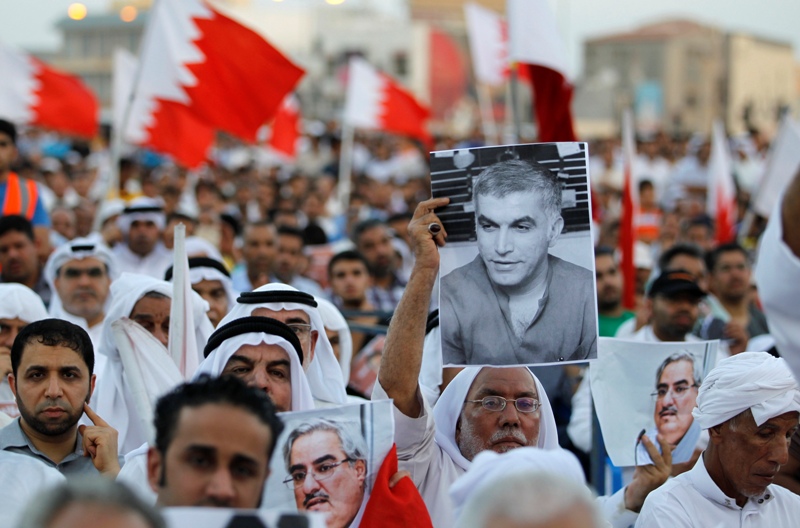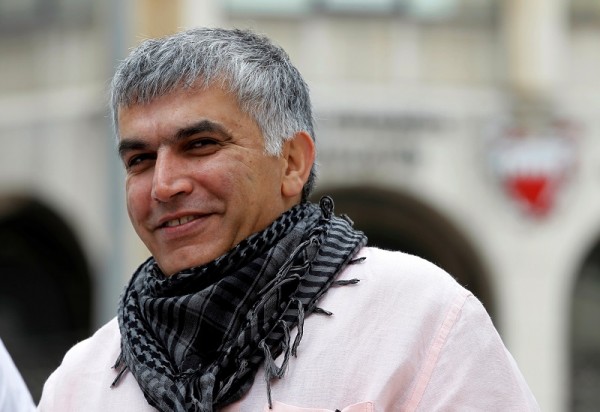Prominent human rights defender Nabeel Rajab, who has been held behind bars in Bahrain for 81 days, should be freed immediately and unconditionally, a coalition of 34 rights groups, including the International Press Institute (IPI), said today in a letter to Bahrain’s king.
The groups made the call one day after the 52nd birthday of Rajab, who faces more than a dozen years in prison if convicted on charges that many see as reprisal for his work promoting fundamental human rights in the Persian Gulf island nation.
The charges reportedly stem from Rajab’s allegations of torture at a Bahrain prison and his criticism of human rights violations during the ongoing conflict in Yemen, where Bahrain has supported a Saudi-led coalition fighting against Houthi rebels. Rajab’s next hearing is set for Monday.
International observers are widely concerned about Rajab’s deteriorating health since his arrest. He is currently held in what his family characterises as “unhygienic” conditions and supporters accuse Bahrain’s government of failing to give him adequate medical care.
The full text of the letter, originally posted on the website of the Bahrain Center for Human Rights (BCHR), which is headed by Rajab, can be read below.
Today’s call came on the heels of the release of a report on Wednesday by the BCHR titled “Digital Rights Derailed in Bahrain”, which examines and discusses measures taken by Bahraini authorities to tighten their grip on the Internet and increase surveillance of content published online, as well as the ongoing prosecution and detention of Internet users.
The report notes the high degree of Internet penetration in Bahrain and the key role that has played in allowing civil society activists and opposition figures to organise activities, particularly during the pro-democracy movement of 2011. But it argues that the country is one “in which people feel the least safe to express their opinion, criticize the government or talk about politics”, pointing to the number of Internet users who have been giving prison terms for exercising their right to free expression on the Internet and independent social media, including 16 currently behind bars, in addition to Rajab.
The BCHR has complained that Bahraini authorities’ efforts to silence critical voices are not limited to the online sphere, noting that nearly all of the Center’s public figures in Bahrain have been banned from leaving the country. In the latest move, authorities on Monday prevented BCHR Head of International Relations Nedal Al-Salman from travelling to Geneva, where she was scheduled to speak about Bahrain’s crackdown on rights defenders and civil society in connection with the 33rd session of the U.N. Human Rights Council (UNHRC).
Al-Salman told IPI at least 11 human rights defenders have learned of travel bans in the last two weeks, which activists believe is a tactic to keep them from participating in the UNHRC meeting. She also said the government’s efforts take both a toll on the activists’ ability to work and their psychological health, commenting: “[A] person feels unable to move, to work or to make a decision, and we know that this is a tool used to stop us from reporting [human rights] violations.”
The travel bans have targeted journalists as well. In June, Nazeeha Saeed, an award-winning journalist and correspondent for Radio Monte Carlo Doualiya and France24, was charged criminally with reporting for the outlets without a required licence from Bahraini authorities. Saeed told IPI that her travel ban has been lifted, but that the criminal case against her is proceeding.
***********************************************************
HM Shaikh Hamad bin Isa Al Khalifa
Office of HM the King
P.O. Box 555, Rifa’a Palace
Kingdom of Bahrain
Cc. The Rt Hon Boris Johnson MP
Secretary of State for Foreign and Commonwealth Affairs
Foreign & Commonwealth Office
King Charles Street, London SW1A2AH
Cc. The Honorable John F. Kerry
Secretary of State
United States Department of State
2201 C Street NW, Washington, DC 20520
Cc. Federica Mogherini
High Representative of the European Union for Foreign Affairs and Security Policy
Cc. Zeid Ra’ad Al Hussein
United Nations High Commissioner for Human Rights
2 September 2016
Urgent Appeal for the Release of Human Rights Defender Nabeel Rajab
Your Excellency,
In light of recent alarming events in Bahrain, the undersigned NGOs express our deepest concerns about the ongoing detention of prominent human rights defender Nabeel Rajab based on his peaceful exercise of the right to freedom of expression. We urge the government of Bahrain to immediately and unconditionally release Rajab.
On 13 June 2016, the authorities arrested Rajab, who serves as President of the Bahrain Center for Human Rights (BCHR), Founding Director of the regional Gulf Center for Human Rights (GCHR), Deputy Secretary-General of FIDH, and a member of the Advisory Committee of Human Rights Watch’s Middle East Division. Rajab’s arrest is one in a series of repressive actions to severely restrict the work of human rights defenders and civil society members in the Kingdom of Bahrain.
In the wake of an unprecedented crackdown, we believe the detention of Rajab to be an act of reprisal for his work to promote fundamental human rights in Bahrain, as well as a means to restrict Rajab’s freedom of expression and speech. He is charged for tweets and re-tweets about allegations of torture in Bahrain’s Jau Prison, which were investigated by many local and international NGOs, and about the widely reported and criticised human rights violations during the war in Yemen. In total, Rajab could serve up to 15 years in prison for his statements via Twitter.
Rajab faces up to 10 years in prison if convicted of spreading “false or malicious news, statements, or rumours” under article 133 of Bahrain’s penal code; a further two years imprisonment if convicted under article 215 of the penal code for “offending a foreign country [Saudi Arabia]” for tweets related to the Saudi-led war in Yemen and an additional three-year sentence if convicted of “offending a statutory body” under article 216 of the penal code for comments relating to Jau prison in Bahrain.
In addition to these charges, he may also face a trial on charges of “spreading false news” for similar statements made during televised interviews last year. That case has not yet been referred to court, but is believed to have served, among others, for his arrest on 13 June.
Due to the poor detention conditions, Rajab’s health has been severely deteriorating since the time of his arrest. He continues to be held at West Riffa police station and family visits are being monitored very closely, according to his lawyers. His cell does not meet the requirements for long-term detention and the sanitary facilities are unhygienic. He has lost eight kilos since his arrest. Rajab has chronic inflammation in his lower back requiring urgent surgery, which has been delayed by the authorities until early September. In addition, he is also suffering from an irregular heartbeat, which has decreased below the normal range during his detention, and has also suffered from chest pains recently, having required a visit to the clinic. Despite the fact that he requires urgent medical treatment, prison authorities do not appear to provide sufficient medical assistance for most of these ailments. In the meantime, Rajab is dependent on his family to provide him with painkillers and bandages for his bleeding due to his ulcer.
Following his arrest, Rajab’s case has received widespread international attention by government officials and UN dignitaries, inter alia, by the spokesperson of the U.S. State Department, the spokesperson of U.N. Secretary-General Ban Ki-Moon, as well as by members of the European Parliament, who adopted an urgent resolution condemning the Bahraini authorities’ crackdown on civil society and on the political opposition.
As a signatory to international human rights conventions, the Government of Bahrain is bound to guarantee the right to freedom of expression for all in Bahrain, including Nabeel Rajab. Depriving Rajab of his liberty for peaceful social media posts goes against Bahrain’s commitment to uphold these international conventions and raises the question of its ability to respect its legal obligations within the wider international community.
To date, the government in Bahrain has repeatedly demonstrated unwillingness to comply with international legal standards, despite promises made at the United Nations during its Universal Periodic Review, and during its own national inquiry, the Bahrain Independent Commission of Inquiry (BICI).
We therefore urge you to abide by the principles of democracy and human rights and to safeguard freedom of expression in Bahrain, as enshrined in international human rights legislation, by dropping all charges against the human rights defender, Nabeel Rajab and ensure his immediate and unconditional release.
Sincerely,
Americans for Democracy and Human Rights in Bahrain (ADHRB)
Bahrain Center for Human Rights (BCHR)
Bahrain Institute for Rights and Democracy (BIRD)
Bahrain Press Association (BPA)
Brian Dooley, Human Rights First
Canadian Journalists for Free Expression
CIVICUS
Committee for the Respect of Liberties in Tunisia
English PEN
European-Bahraini Organisation for human rights (EBOHR)
European Center for Democracy and Human Rights (ECDHR)
FIDH, within the framework of the Observatory for the Protection of Human Rights Defenders
Gulf Centre for Human Rights (GCHR)
Human Rights Sentinel
IFEX
Index on Censorship
International Press Institute (IPI)
Jesper Højberg, Executive Director, International Media Support
Khiam Rehabilitation Center for Victims of Torture
Lawyers Rights Watch Canada
Libya Al-Mostakbal Centre for Media & Culture
MADA Palestinian Center for Development & Media Freedoms
Maharat Foundation
Moroccan Association for Human Rights (AMDH)
No Peace Without Justice
Pakistan Press Foundation
Project on Middle East Democracy (POMED)
Reporters Without Borders (RSF)
Salam for Democracy and Human Rights
Tunis Centre for Press Freedom
Tunisian League for Human Rights (LTDH)
Tunisian Forum for Economic and Social Rights
Vigilance for Democracy and the Civic State
World Organisation Against Torture (OMCT), within the framework of the Observatory for the Protection of Human Rights Defenders



